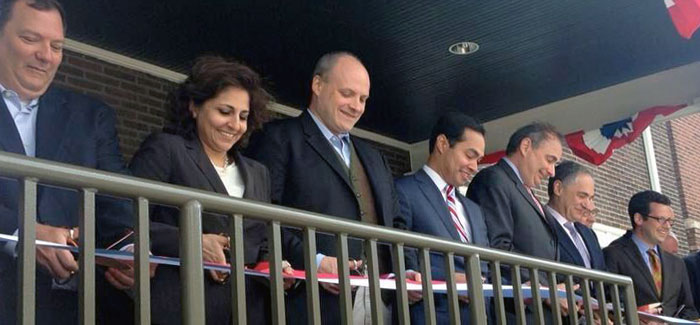
From left to right: IOP board of advisers Larry Grisolano; Neera Tanden; Howard Wolfson, AB’89; and Julián Castro, join IOP director David Axelrod, AB’76; UChicago president Robert J. Zimmer; and IOP executive director Darren Reisberg to cut the ribbon to mark the official opening of the Institute of Politics. (Photo courtesy Institute of Politics)
At an Institute of Politics event, Republican leaders offer diagnoses and prognoses for a wounded party.
One could be forgiven for thinking the Institute of Politics was already technically open. Since September the institute, led by Obama adviser David Axelrod, AB’76, has been lacing the University calendar with headline events: election previews and postmortems, a gun-violence panel, conversations with Newt Gingrich and Jon Huntsman.
In fact it wasn’t until Monday, April 8, that the ribbon was officially cut, making an honest institute of the IOP. To mark the occasion in plugged-in Axelrodian style, that evening five prominent Republicans took the stage at International House to take on the question “What’s Next for the Republican Party?” Chris Wallace of Fox News moderated a panel including former Mississippi governor Haley Barbour, Weekly Standard editor Bill Kristol, Romney campaign adviser Beth Myers, National Review writer Ramesh Ponnuru, and political consultant Mike Murphy.
The five plied their hindsight with gusto but their crystal balls with trepidation. Looking back at the 2012 presidential election, they attributed Mitt Romney’s loss to factors ranging from the other side’s money (“enough to burn a wet mule,” per Barbour); the bruising primary race; tone (“people thought we were shrill and snotty,” Barbour again); and basic Republican messages and policies.
Murphy pressed the last point hard. The party, he said, is “not dead but experimenting with death a little.” It will have to do some “hard things” to win back the White House in 2016, demonstrating to voters two points: “We’re not crazy, and we’re the party of the middle class." Doing a better job speaking to Asian and Latino voters will help, he said, as will modernizing the party’s approach to health care. Murphy also emphasized the need to get out ahead of same-sex marriage legalization instead of being “dragged behind” it: “It’s about getting in the door with 35-and-under voters to pitch your other ideas.”
Same-sex marriage was a running topic and a point of consensus. Wallace asked the audience, which included liberals but seemed mostly on the same political page with the panel, who among them supported same-sex marriage rights. If a few didn’t raise their hands, they were hard to spot. But when Kristol asked a quick follow-up—how many would change their vote over the issue?—most hands stayed down, supporting his argument that it’s still the economy, stupid. “Have a pro-middle-class tax policy” and an upward-mobility message, he advised. Romney, he thought, spoke “too much about the glory of entrepreneurship, too little about the virtue of solid middle-class” work.
The Obama campaign capitalized on that focus. Some polls, he said, showed that voters preferred Romney for the economy, foreign policy, and managing the country. What he couldn’t overcome was voters’ perception that he didn’t care about people like them. For Barbour, the opposition did too good a job of painting Romney as “a quintessential plutocrat married to a known equestrian.” And the candidate didn’t help matters with his 47 percent remarks—more damaging, Kristol said, for coming in a talk to wealthy donors.
What of 2016? None of the panelists would pin their hopes or predictions on fewer than a handful of hopefuls, from Jeb Bush to Paul Ryan to Bobby Jindal to Marco Rubio. “We need to see them perform” before prognosticating, said Ponnuru. With luck, a Bill Clinton-like figure would emerge to move the party toward the center; without such a candidate, said Murphy, he feared the rise of Texas senator Ted Cruz, potentially “our McGovern.” Bill wasn’t the only Clinton invoked. Asked in the Q&A which Democrat they most feared running against, Barbour almost didn’t wait for the end of the question to answer: “Whoever beats Hillary.”
